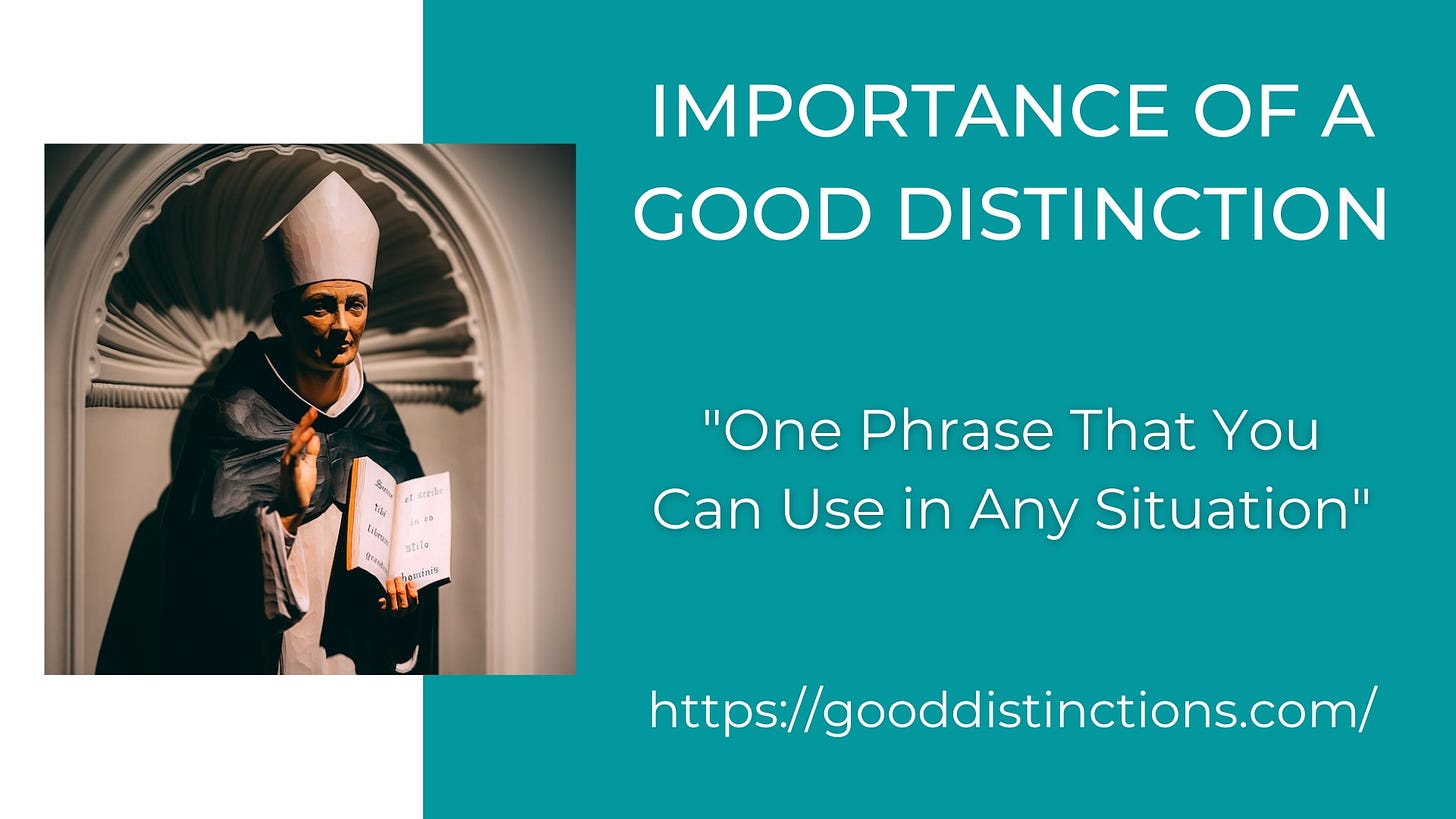My Favorite Maxim - Seldom Affirm, Never Deny, Always Distinguish
My favorite maxim is "Seldom affirm, never deny, and always distinguish." A maxim is a short, pithy statement which communicates a truth or a rule to live by. In my own experience, there are few phrases which have gotten more mileage. Of course, I should qualify that I am referring to maxims which are not contained in Sacred Scripture. The Bible is filled with pithy, life-giving statements because it is the inerrant written word of God, revealed by Him for our good. But, of the maxims put to paper by men, this is my favorite.
The phrase "Seldom affirm, never deny, and always distinguish" has been passed down by the Dominican Order of Preachers and is attributed to the 13th Century master St. Thomas Aquinas. The truth of this maxim shines forth in its practicality. Like any virtue, the desire to make the right distinctions is a balancing act.
Never Deny - Leave Room for Truth
First and foremost, we cannot deny anything out of hand. There is always some kernel of truth in whatever is being discussed. Further, if someone has brought a claim, idea, or question to you, then it matters to them. Therefore, out of charity, we should not outright deny what we have been brought, lest we push our interlocutor away unnecessarily. Always in charity, we first listen before we respond.
As the Prayer of St. Francis says so beautifully, "seek first to understand rather than be understood." And as the Lord says, speaking of all the many good things that we seek in the world: "Seek first the kingdom of God and his righteousness, and all these things will be added to you (Mt. 6:33)." We do not receive by anxiously projecting our own values first. We have to seek what God wants in any situation, which is always guided by charity.
Besides, G.K. Chesterton once said it well, "A heresy is a truth gone mad." And St. Thomas More said, "Never was there a heretic who spoke all false." Even Satan can speak some truth, as we see in his quoting of Scripture to Christ, and even he himself, Enemy of the Good, exists and therefore shares in some goodness by virtue of his being.
Therefore, anything that is stated is unlikely to be completely wrong. As we answer, we must leave room for truth by never denying outright what is being presented. We do so to our own peril.
Seldom Affirm - Let Your "Yes" Mean "Yes"
If we are slow to deny, we must be nearly as slow to affirm. As Jesus says in the Sermon on the Mount: "Let what you say be simply 'Yes' or 'No'; anything more than this comes from evil (Mt. 5:37)." Our "yes" must mean "yes" and our "no" must mean "no." If a proposition or idea is posed to us by another human being, the likelihood that it is 100% completely correct is low. Just as we do not want to deny outright and throw away some truth, we do not want to admit untruth alongside truth. To say "yes" and affirm something which has some mixture of untruth is like drinking water with just a little bit of poison.
Practically speaking, human beings think quickly. If you grant ground to your interlocutor by affirming their statement unequivocally, then they might be misled to think that you agree with everything that they have said. Chances are, you have a distinction you might want to make. But it will seem like backtracking if you then seem to change course on something that you have already granted.
Always Distinguish - Making the Right Distinctions
"Same difference!" - To make a distinction without difference is useless. When this is employed, it generally is linguistic only and does not correspond to reality. There is a legal phrase in Latin which says "de minimis non curat lex" which means "the law does not concern itself with trifles." For example, someone could say, "I only stretch the truth; I didn't lie." Well, of course stretching the truth means to lie. It is a distinction without difference.
So, what is the right distinction to make? Making distinctions is about describing boundaries, not things. Instead of allowing things to be unbounded and free floating, a distinction acclaims what a thing is not or what it is. True, we can over-define things, but the subject of this article is about striking the right balance.
We also want to make sure that we are not trying to "win an argument" with distinctions. To distinguish is to search for the truth. You could visualize it as drilling deeper into the Earth's Core to study something in greater detail or soaring higher into the sky to get an aerial view. In both cases, we have a change of perspective. The subject being studied has not changed, however.
In making distinctions, it is important to sort out what is important and germane to the conversation and what is not. Perhaps a distinction is important to you, but is not important to your interlocutor. In this case, you have to be self-reflective and determine if you 1) are wrong, 2) need to change how you are presenting something, 3) you have made a distinction without difference, or 4) if the conversation has reached an impasse.
We must never assume that we have the same meaning of a word as our interlocutor, especially today when so many words are made up out of whole cloth. Practically, we can ask for clarification. "When you said *this*, did you mean ....?" This allows the interlocutor to clarify, allows you to understand, and then gives you a foundation to respond.
Putting It All Together
Conversation is based on human relationships. We must be interested in seeking the truth, not in being right or convincing anyone of anything. If what we say is true and the reasoning is sound, then the interlocutor will be convinced by the weight and ring of truth.
In the context of faith, the Holy Spirit is the agent of conversion, not us. As a believer that all truth is God's truth, I think this holds for any subject of conversation. This takes the pressure off of us in terms of "winning."
Next time you are having a conversation, try to take a step back and apply this maxim. In charity, seldom affirm what is being said so that you do not unwittingly grant an untruth. Never deny what is being said outright, lest you throw out the baby with the bathwater. And always distinguish. Making the right distinctions is the spice of life and is indispensable to living a peaceful life.























Importance of a Good Distinction